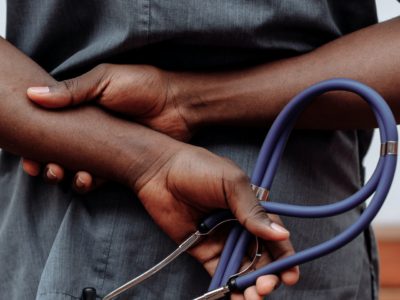There’s been a lot of debate and uncertainty around the idea of vaccinating pregnant women for the COVID-19. Many soon-to-be mothers are holding off until the medical community knows more about how the drug will affect their bodies and the delivery.
However, pregnant women are getting some good news. A fully vaccinated healthcare worker just gave birth to the first baby with COVID-19 antibodies, which should protect them from illness. It’s a promising sign that the vaccine is both safe and effective for pregnant women – and maybe even their unborn children.
A Special Delivery
The south Florida healthcare worker was 36 weeks pregnant when she got her first dose of the Moderna COVID-19 vaccine. She gave birth to a healthy baby girl just three weeks later. Doctors say this is the first case of an infant being born with COVID-19 antibodies in the U.S.
Dr. Paul Giblert and Dr. Chad Rudnick recorded their findings in a pre-print study that has yet to be peer-reviewed. They found evidence of the antibodies at the time of delivery after analyzing blood taken from the umbilical cord.
“We have demonstrated that SARS-CoV-2 IgG antibodies are detectable in a newborn’s cord blood sample after only a single dose of the Moderna COVID-19 vaccine. Thus, there is potential for protection and infection risk reduction from Sars-CoV-2 with maternal vaccination,” the study states.
It was already known that some pregnant women who have been previously infected with COVID-19 can pass antibodies down to their children. There’s also plenty of scientific precedent to support this idea. Pregnant women often pass antibodies through the placenta after being vaccinated for other diseases, such as influenza.
However, Dr. Giblert and Dr. Rudnick make it clear that more research is needed to see whether the vaccine is safe and effective for pregnant women.
To answer this question, Pfizer and BioNTec just started the world’s first clinical trial for the COVID-19 vaccine exclusively for pregnant women. The trial will include 4,000 soon-to-be mothers from around the world. The companies expect the trial to conclude in January 2023, so some pregnant women may continue to hold off until they have more concrete information.
For its part, Moderna has created a registry to track how the vaccine is affecting pregnant women as shots continue to be administered throughout the U.S. and abroad. Johnson & Johnson plans to study the effects of its drug in pregnant and lactating women as well.
Dr. Neeta Ogden, an internal medicine specialist and immunologist, believes this is a promising step for pregnant women everywhere. “It really starts aligning the COVID vaccine with those vaccines that we already use in pregnant women like the flu vaccine. We really need, and it is clear that we need, significant data on how safe it is in pregnant women.”
The news could also change the way health officials think about vaccinating children, considering none of the vaccines have been approved for children under 16.
“This also is hopeful because it offers a level of protection to one of the most vulnerable populations, the newborn,” Dr. Ogden added, “If we can see this kind of safe maternal transmission of antibodies from the vaccine to newborns, I think that’s really a great step in the right direction.”
Supporting the Findings
While the original pre-print study has yet to be peer-reviewed, Dr. Giblert and Dr. Rudnick aren’t the only ones investigating this issue.
Massachusetts General Hospital recently studied how the Pfizer and Moderna vaccines affect 131 women, 84 of which were pregnant, 34 were breastfeeding, and 16 were non-pregnant. The researchers found both vaccines to be safe and effective among the control group. They also found evidence of antibodies in the placenta and samples of breast milk.
Co-author Dr. Andrea Edlow, a maternal-fetal medicine specialist at Massachusetts General Hospital, said, “Maternal vaccine-generated antibodies were detected in the umbilical cord blood of all 10 babies who delivered during our study period. Our data suggest that receiving both shots of the mRNA vaccine leads to improved antibody transfer to newborns.”
A study from Israel also discovered antibodies in all 20 pregnant women who received either the Moderna or Pfizer vaccine.
We’re getting closer to understanding how these vaccines affect pregnant women. Thousands of expectant mothers have already taken the shots. There are currently no known risks for pregnant women looking to get vaccinated, but scientists are still gathering and analyzing the data.

















